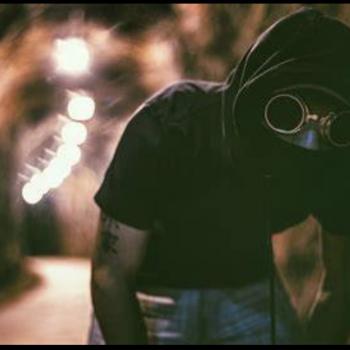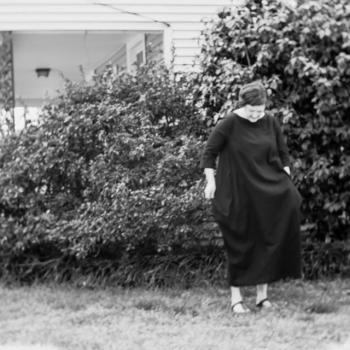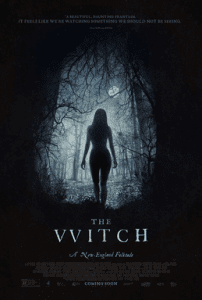Last week, my brother was visiting from out of state, and one night he told me that he wanted to watch a “campy” movie, something light and fun. I suggested Practical Magic, the witch movie from the ‘90s with Sandra Bullock and Nicole Kidman based on an Alice Hoffman novel. Very soon after starting it, I remembered that this is, in fact, a somewhat unsettling movie. The Puritan witch in the opening barely escapes hanging, then curses herself and her descendants so that they cannot love without punishment. Generations later, an abusive man is accidentally murdered with belladonna, then revivified, then murdered again. Gruesome. At one point, I paused the movie to get up and pee, and when I came back into the living room, my brother asked me if I’d heard a laugh. “No …,” I replied, explaining that it may have been college students drifting past the open window on their way to somewhere else. My brother said, that, no, it had sounded like it was coming from the hallway in between the living room and the bathroom. We then, as is our wont, became utterly convinced that a ghost had gotten in (to paraphrase James Thurber). We crept around the house, peering into my sleeping son’s room and into closets, then settled back down onto the couch, officially spooked. This is how my family does togetherness, with a dose of camp, pinch of the uncanny, and dash of the absurd.
A few years ago, I wrote a poem that included these lines: “Yesterday I kept walking through small clouds in the apartment,/ wafts of jasmine or ambergris, and imagining someone unseen/ watching over us, when really it could have been/ the new hand soap. The simplest explanation is always/ the most clearly boring.” Here, as poet, I am taking the license of refuting Occam’s Razor. Part of my character (and perhaps a family trait) is a tendency toward loose, associative thinking. This is a trait shared by children, artists, and—in a way that can make life difficult—by the mentally ill. Taken too far, this tendency can become a troubling jump away from reality. (In fact, the title of my above-mentioned poem, taken from the Scottish science fiction writer Iain M. Banks, is “Refreshingly Unconcerned with the Vulgar Exigencies of Reality.”) However, I would argue that cultivating my interest in the unexplained, the uncanny, the mysterious, or just the imagined mysterious, has been central to my project of taking myself seriously as an artist. In noticing the magic and weirdness of life, I give myself permission to point it out to others.
Listen to Joanna’s ghost dreams on Sick Pilgrim’s SoundCloud page:
I am at my grandmother’s house, sitting with her at the kitchen table that’s been there since before I was born, a glass-topped table with a yellow-painted wrought iron base. I am an adult and visiting by myself, and, as she’s done many times before, my grandmother is sitting in her spot at the table and telling me things. She tells me that recently she’s had a quite vivid dream of my grandfather, and as she describes the feeling of it to me, I can feel it, too, along the “psychic family network” that exists among me, my mom, and grandmother. (“Mom feels a disturbance in the Force,” my uncle will report to me. “Is everything ok there?” This happens when I’m feeling especially unsettled. She knows.)
In the dream of my grandfather, he is downstairs paying bills, and she is upstairs in bed realizing that he has come back. “And after all that time,” she says, sounding as irritated as if had really happened, “he won’t stop paying the damned bills and come up to bed!”
*
I dreamed of him, too, years before.
I’m a teenager in Kansas, and I open my eyes to see my grandfather somehow sitting on top of my tall bookcase in the corner, perched there casually in his golfing clothes, the white Penguin shirt glowing a bit in the dark room. As my eyes focus on him, he makes a report: “Don’t worry. Death’s not that bad.” The remark is delivered as if we’d been in the middle of a conversation about death, as if I’d posed a question. He’s gone then, unwilling or unable to say more, and I understand that this is his character. Taciturn. Prone to provoking curiosity, then consternation, and finding amusement in that.
It must have been a dream. I’ve been so nearsighted for so long that there’s no way I would have been able to make him out across the room in the dark without my glasses.
*
During the course of my young adulthood, I had a few other dreams of my dead that held the quality of a visitation. In one, my great-grandfather is in a room at the end of a long hallway. I am not to go in there, but I understand that he may speak to me from inside the room if I stand at the other end of the hall. He knows I’m there but cannot come to me. There’s a single window down at the very end, near his open door. From down toward that end, I hear him say, “You have everything you need. Use everything you have.”
*
The most vivid dream happened in my studio apartment on Spruce Street in Philadelphia during graduate school. That apartment was haunted, anyway. I remember being in the bed in the corner in the middle of the night, and feeling sure that something was hanging in the center of the room. Someone, I mean. Another night, I dreamed that I was across the room looking at the bed, where my childhood friend Angela was lying in a state of suspended animation. I learned in my 20s that Angela, who I hadn’t seen since we were 12, had died in a car accident while pregnant with her first child. The baby was near term, but did not survive. But there she was in my studio apartment, in my bed, unable to awaken but somehow also conscious. As I was trying to figure out if there was a way to rouse her, I felt a wave of intense anger emanating from her, as if she were psychically shrieking, “I can’t be alive, so you have to live for both of us. If you don’t enjoy it, I’ll figure out how to take your place!”
*
I don’t consider this one a dream, but I’ll tell it here, anyway:
I am in my upstairs office in our apartment in the back of a hundred year-old Victorian house on Ocean Avenue in Brooklyn, pregnant and sleeping on the spare bed, which has been my bed this last trimester. Clif peeks in to look at me before work. I don’t open my eyes, but I know it is morning and that he is about to leave for work. I’ve heard him downstairs showering and preparing the coffee. Now he’s come up to the attic floor where our offices are to look in on me before leaving to catch the Q train to his job in midtown. He lingers on the sight of me for a long moment. There is a feeling of checking in, of assessing. In my barely conscious state, I suppose that he is assessing whether I’m awake, whether to say goodbye out loud. There’s also some feeling of taking stock. “Well, there she is,” his presence seems to be saying. “How did we both get here?” I am heartened by the gesture but slightly unsettled. Why is he just standing and looking? Then I’m completely asleep again.
Later that morning, I’m drinking my half-caff and planning my day when I decide to call him at work. “Did you open the door and look at me before you left this morning?” I ask. He tells me he didn’t. “You didn’t come up the stairs to say goodbye and look in my room when I was sleeping?” He tells me again that he didn’t. “I didn’t come upstairs at all this morning,” he says.
Joanna Penn Cooper is the author of The Itinerant Girl’s Guide to Self-Hypnosis (Brooklyn Arts Press), a book of lyrical shorts, and What Is a Domicile (Noctuary Press), a book of poems. She lives in Durham, North Carolina. She curates the “Approaching Mystery” series for Sick Pilgrim, publishing flash essays by writers encountering the unseen, the uncanny, and the unresolvable.












